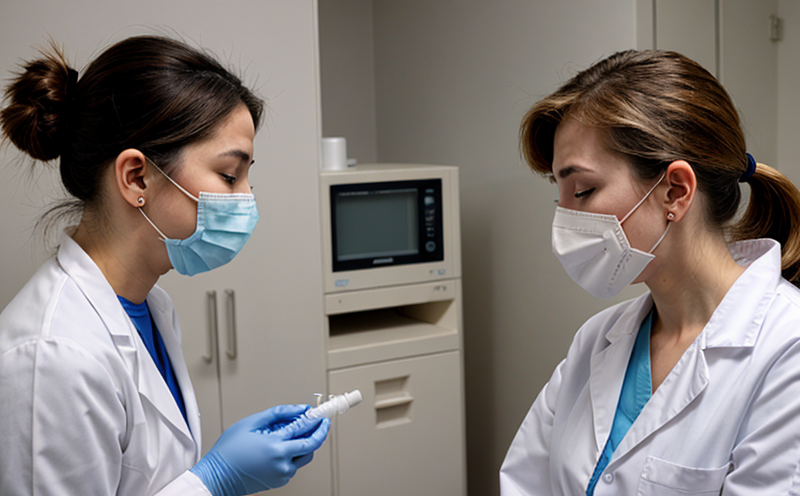Food Allergen Detection Testing (Milk, Egg, Soy, Peanut, Tree Nuts)
In today's healthcare landscape, food allergen detection testing plays a crucial role in ensuring patient safety and compliance with regulatory standards. This service focuses on the identification of key food allergens such as milk, egg, soy, peanut, and tree nuts. These tests are essential for maintaining quality control in clinical environments where patients may have severe allergic reactions to these common allergens.
Our service is designed to support healthcare facilities by providing accurate, reliable, and timely results that can help prevent serious health risks. The testing process involves the use of advanced instrumentation, including immunoassay systems and mass spectrometry techniques, which ensure high sensitivity and specificity in detecting even trace amounts of allergens.
For milk allergy detection, we utilize methods like enzyme-linked immunosorbent assays (ELISAs) to measure IgE antibodies specific to cow's milk proteins. Egg allergy testing might involve the use of cut-off values based on international standards such as those specified in ISO 15216-4. Soy allergy tests typically employ ELISA or immunoassay technologies, while peanut and tree nut allergy detection often rely on Western blotting combined with specific IgE antibody measurements.
The specimen preparation process is critical to ensure accurate test results. Samples can include blood serum, plasma, or cutaneous patch tests for skin reactions. In some cases, dietary samples may be analyzed as well. Proper handling and storage of these specimens are paramount to prevent degradation or contamination that could lead to false positives or negatives.
Our laboratory employs experienced technicians who follow strict protocols to prepare and process each specimen according to the recommended guidelines provided by relevant international standards like ISO 15216-4 for egg allergy testing. This ensures consistent quality across all tests performed in our facility.
The results from these tests are then analyzed using sophisticated software that interprets the data against established reference ranges. Reports detailing the presence or absence of allergens along with their concentrations are generated promptly and accurately to assist healthcare providers in making informed decisions regarding patient care plans.
By leveraging state-of-the-art technologies and adhering strictly to best practices, we aim to deliver comprehensive solutions tailored specifically towards meeting the needs of our clients operating within this highly regulated field. Our commitment to excellence ensures that every test conducted contributes significantly towards enhancing overall patient safety standards across various clinical settings.
Benefits
Implementing food allergen detection testing in your organization offers numerous advantages, including:
Enhanced Patient Safety: By identifying potential allergens early, you can take proactive measures to protect at-risk individuals from adverse reactions.
Regulatory Compliance: Ensuring adherence to strict industry standards helps avoid penalties and maintains a positive reputation among stakeholders.
Informed Decision-Making: Accurate test results enable healthcare professionals to tailor treatments more effectively, improving patient outcomes.
Patient Satisfaction: A safer environment fosters trust between patients and caregivers, leading to higher levels of customer satisfaction.
Eurolab Advantages
At Eurolab, we pride ourselves on offering unparalleled expertise in allergy & immunology testing. Our team of professionals brings extensive experience and knowledge to every project, ensuring top-notch service delivery.
We maintain state-of-the-art facilities equipped with the latest technology, allowing us to perform precise analyses that meet or exceed international standards such as ISO 15216-4 for egg allergy detection tests.
Our commitment to excellence is reflected not only in our equipment but also in our rigorous training programs for staff members. This ensures a consistently high level of accuracy and reliability in all our services.
In addition, Eurolab operates under stringent quality management systems that are regularly audited by independent bodies to guarantee adherence to best practices throughout the entire testing process.
Quality and Reliability Assurance
To maintain the highest standards of accuracy and precision, Eurolab adheres strictly to internationally recognized guidelines. For instance, when performing milk allergy tests, we follow ISO 15216-4 which provides detailed protocols for both in vitro diagnostic devices (IVDs) and laboratory methods used in diagnosing food allergies.
Our quality assurance measures extend beyond just following prescribed procedures; they also include continuous monitoring of performance metrics such as inter-laboratory comparisons, participation in proficiency testing programs recognized globally by bodies like the European Federation for Clinical Chemistry and Laboratory Medicine (EFCCLM).
Incorporating feedback from these exercises allows us to identify areas where improvements are necessary and implement changes promptly. Furthermore, regular internal audits conducted by our dedicated quality assurance team help maintain consistency across all aspects of our operations.





